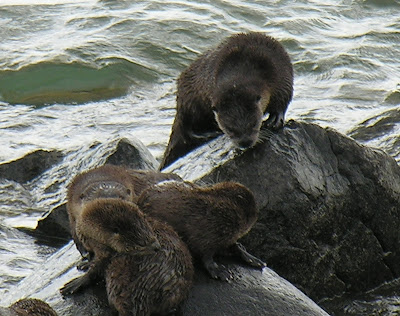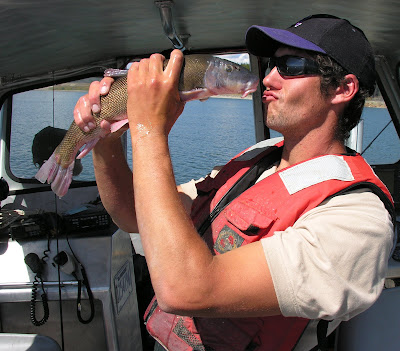Anyway, time to interrupt this ramble with some pictures:




The otters in the third picture are chowing down on suckers, a bottom-feeding fish with a vacuum-like, toothless mouth that slurps up vegetation and detritus off the lake floor. Suckers are an invasive species (though an apparently harmless one), so, good job, otters. But these otters are far from the only organisms with an affinity for suckers:
 Going in for what promises to be a very wet Sucker Pucker.
Going in for what promises to be a very wet Sucker Pucker.I’m not sure why I love these fish so much, but I suspect it has something to do with their indestructibility. Suckers are invincible, I’m convinced, the Rambos of the fish world. We’ve left suckers high and dry on our boat’s deck for up to an hour, then released them and watched them swim off, totally unfazed. How could you not love such a resilient fish? Any creature with a will to live so intense and a respiratory system so well evolved deserves some affection. The Fisheries Program has a tradition that every newbie kiss the first sucker they encounter; let’s just say the first sucker I met was far from the last one I smooched.
Suckers and otters were among the highlights of the cutthroat assessment, but they weren’t the only perks. We spent the week setting nets at several sites known as cutthroat strongholds, monitoring the species’ health; this brought us into contact with some gorgeous cutts – and, given the population’s failing numbers, it’s always exciting to haul up healthy and huge cutthroat.
Suckers and otters were among the highlights of the cutthroat assessment, but they weren’t the only perks. We spent the week setting nets at several sites known as cutthroat strongholds, monitoring the species’ health; this brought us into contact with some gorgeous cutts – and, given the population’s failing numbers, it’s always exciting to haul up healthy and huge cutthroat.
 Crew chief Brian Ertel holds up a cutthroat too heavy to register on our scale, earning the coveted "really damn heavy" on the data sheet.
Crew chief Brian Ertel holds up a cutthroat too heavy to register on our scale, earning the coveted "really damn heavy" on the data sheet.Because many of the cutthroat population centers are located in the lake’s extreme southern reaches, to which the insidious lake trout haven’t yet migrated, we sometimes found ourselves setting nets several hours from our home marina. On those nights, we stayed in NPS cabins: fully furnished, albeit very cozy, houses dedicated to rangers and researchers. The first such night, on tiny Peale Island, was predictably fantastic: although a stiff wind prevented us from leaving the island via our canoe all day, the weather cleared up enough for me to take the craft out at midnight, under a canopy of stars so dense that the white swatches of Milky Way overhead nearly dispelled the blackness of the sky. The only sounds that night were bestial: the whistling howl, or “bugle,” of male elks in heat, and the eerie wail of loons echoing across the still water, the cries’ iterations reverberating from shore to shore until our island was veiled by a keening shroud of animal calls.
 Sunset down the Southeast Arm of Yellowstone Lake.
Sunset down the Southeast Arm of Yellowstone Lake.***
That night on Peale Island was spectacular, but not unusual: many times Yellowstone has rendered me euphoric through its wildlife, its scenery, the solitude it provides. These last few months have been some of my life's happiest (Australia/New Zealand excepted), and that happiness, interestingly and somewhat discomfortingly, is predicated upon natural influences, and not human ones. I've gotten a bigger kick out of grizzlies and geysers than, well, people. That isn't to say I've been feeling misanthropic, but this realization demands the question: how will I do in Bangkok? Could any two places, Wyoming and Thailand, occupy more extreme ends of a spectrum? Without otters, cutthroat, and sunsets to thrill me, I'll have to squeeze my joy from societal and cultural sources; will I find such joy in the polluted, claustrophobic din of 12 million people? I can honestly say that I can't say. Stick around to find out, I guess.
End.
furry rock leeches!!!
ReplyDelete